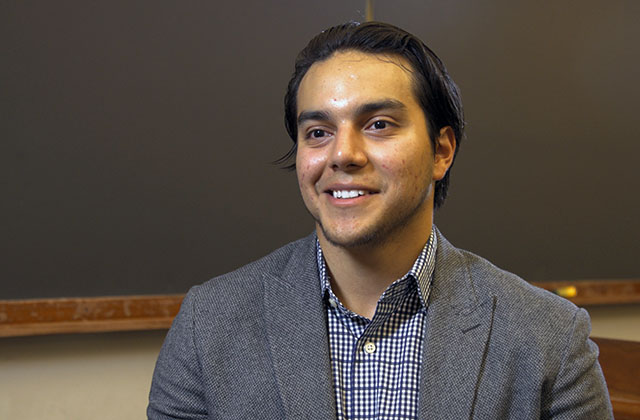Felix Ruano on Why Poor Communities Need a Global Understanding

Felix Ruano. (Asia Society)
Felix Ruano was born to a poor immigrant family in a rough part of Los Angeles, where violence and poverty were facts of life. Nevertheless, he managed to excel athletically and academically. He was captain of his high school soccer, track, and cross-country teams, and served as the school newspaper's editor-in-chief and head of its model UN. Off campus, he did volunteer work in Mexico and Nicaragua and helped start a philanthropic organization called ChangeFire. He was ultimately named a Gates Millennium Scholar and now studies economics and global development at Harvard.
Ruano, who attended a school in Asia Society's International Studies School Network, says that having an international perspective is critical for succeeding in an increasingly globalized world. In advance of the launch of Asia Society's Center for Global Education. He spoke with Asia Blog about how students from disadvantaged communities can develop "global competence" and "break the chain of poverty."
Why is global competence important in today’s world?
We go back to this theme of globalization a lot, even in my university setting. The countries that were dominating a couple of decades ago are no longer the clear winners in this economy, and as we look at the workforce developing into the very globalized workforce, it's very important to understand the different, new skill sets that are required to be a very productive member of society. So when I think about how to instill those skill sets in the new generation and students coming under me, I think about multiple skill sets that are not being really inculcated within a public school or any education environment. And I think global competence relates directly to that, because if we're able to instill this passion for understanding the global economy and how global systems work, in a very direct and very tactical way by targeting very practical skill sets, I think that's the most beneficial way for improving education.
How can we make sure today's youth grow up more globally competent than in previous generations?
That's a very good question. I think there are so many ways to improve this skill set of global competence. When I think about my experiences, there are very targeted ways that I was able to relate to a globally competent curriculum. One that comes to mind is improving curriculums so that they relate more to a global mindset. Essentially, the countries that are the major players in the world have a lot of value to an individual or a student. So in other words, we're no longer saying "these are the skill sets that dominated your parents' generations" or "these are the economies that were dominating your parents’ generation." We're saying: Let's look at the next 50 years and see what the economic trends are, and the global trends that are going to impact the youth of today, and then prepare the youth for that. And that takes a mind shift in what we teach young adults.
What are some challenges that youth from socio-economically disadvantaged backgrounds face in developing a feeling of global citizenship?
I think in communities like the one I grew up in — communities living below the poverty line — the main needs are not even fulfilled when we think about shelter and food. That means education gets pushed to the side, and that's unfortunate because a lot of the circumstances in underprivileged communities, a lot of those situations are related to global trends that, as students, it would be very beneficial to understand — some of the major forces that are creating those conditions. And those forces are not hyper-local, they are not related to just a small community. They are very much a part of major economic forces that are influencing how they are living and how their conditions are affecting education. It's very much an interconnected system. So I think, one way to potentially break that chain of poverty is to instill a better understanding of the global world and see how students can ultimately impact that world directly, whether by education and then eventually through some sort of career trajectory.

